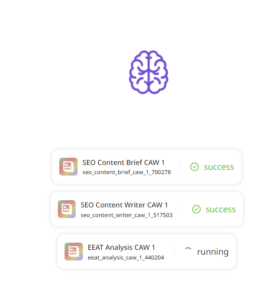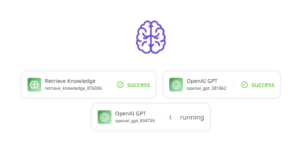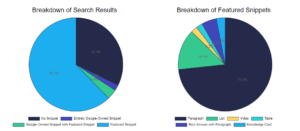This week I tested out an awesome Python script created by Kristin Tynski that uses ChatGPT to create long-form content.
The script creates articles in the 3,000-4,000 word range. It even performs a SERP analysis and optimizes the content for semantic SEO.
You don’t need to know how to code to use it either. I barely know anything about Python and I was able to run it. You only need to enter your API key and a keyword to use it.
Disclaimer:
I don’t recommend publishing pure AI-generated content.
AI tools are still evolving. They don’t match the originality and insights of an expert writer.
I recommend using AI tools to find efficiencies and help writers produce better content.
It’s also important to note that making super long pages doesn’t automatically equate to higher rankings. It’s more about search intent now, but that’s a topic for another day.
Here’s an overview of how the script works and the content it can create.
The script
Kristin provided an excellent overview of how the script works in her LinkedIn post, but here’s a summary:
- The script analyzes the SERPs of the chosen topic to gather info.
- It then generates an initial outline using GPT-4.
- The outline is improved, incorporating semantic SEO insights from the SERP analysis.
- The improved outline is used as a guide to create long-form content.
- The long-form content is further improved and refined
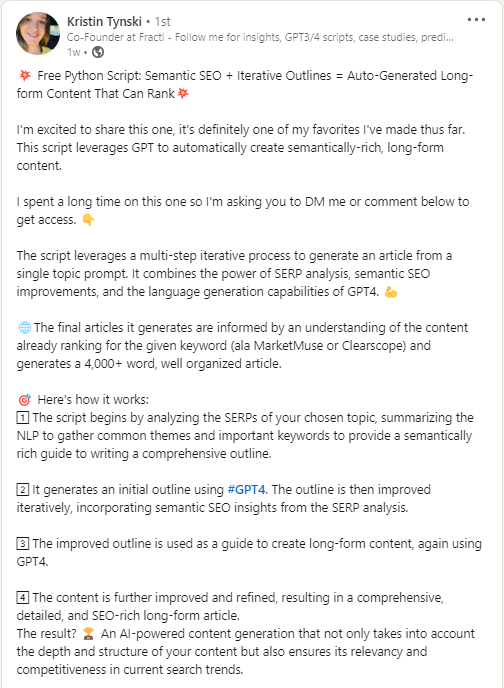
Step 1: Enter a keyword
For my example, I’ve chosen: “What is TF-IDF frequency”.
Entering your keyword is simple, you just swap out the line of text at the very bottom:

After pressing “Run all”, the script gets to work on performing an informative SERP analysis.
Step 2: Automatic semantic brief creation
After collecting insights from the SERPS for your keyword, the script generates a semantic SEO content outline.
The outline is then fed into the next step to inform the long-form content creation process.
Here is the brief that was created for my prompt:
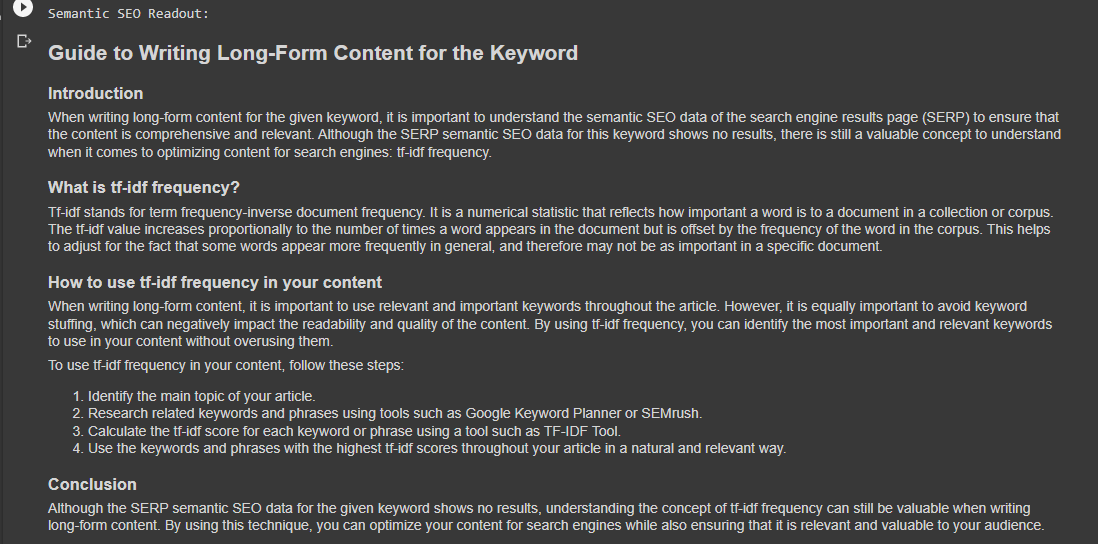
My content brief included an intro, an explainer, how to use TF-IDF frequency in content, and a conclusion. Not bad!
I definitely think an SEO or content marketer could make a better outline by doing their own research, but considering it took 5 seconds to create this I’m pretty happy with it.
Step 3: Semantic Long-form content
Here is the final output based on the brief created in the previous step.
It generated 2,920 words of content including examples and even tables.
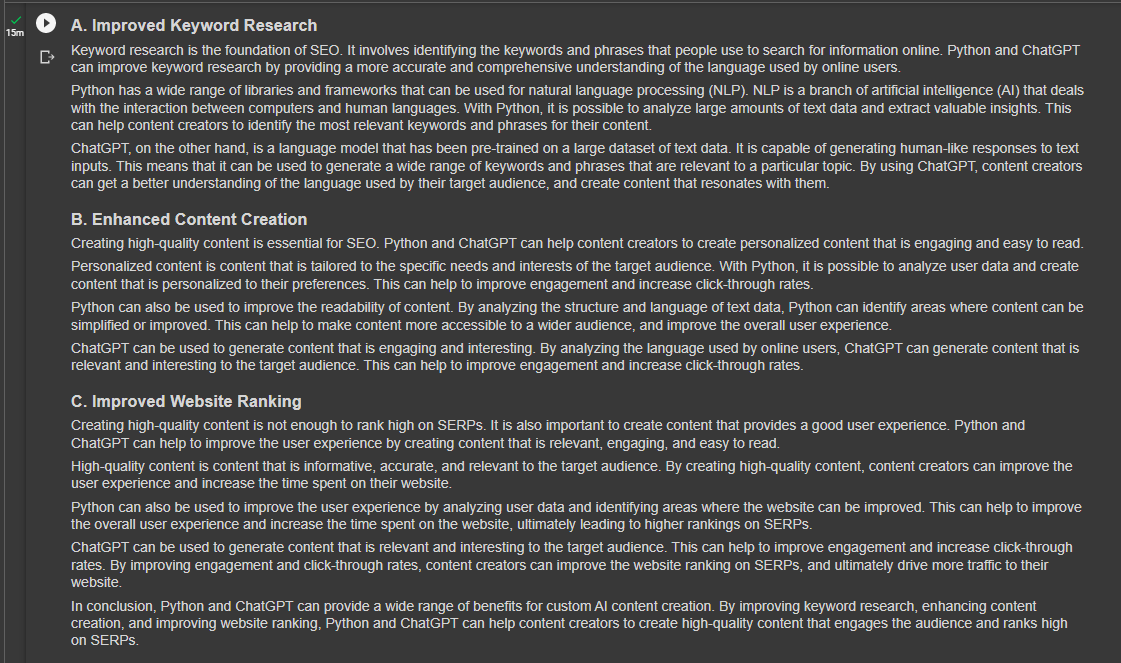
Here’s the full content if you want to check it out.
I’ve tested this script a few times and it does tend to repeat some sections. To be fair, I picked pretty obscure SEO-related keywords and I’m only using GPT 3.5. It would likely do better with GPT-4 and normal topics.
Interestingly, the repeating sections were unique. This provided different angles on the same subtopic.
I could easily mix and match the repeated sections to get a preferred version.
AI detection score:
The example I created scored 89% human on this GPT content detector.
That’s impressive considering I was using GPT 3.5.
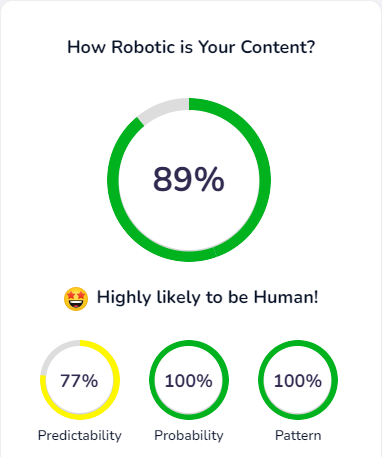
The article is also fairly well-optimized for SEO right off the bat.
It could easily be improved further with some customization, but for the sake of showing you the raw capabilities, I haven’t edited my example content at all.
A previous article I created with this script generated 3,700 words and scored a 40/100 on Surfer and passed as 77% human on GPT detectors.
While GPT content detectors aren’t perfect, this is a higher-than-average score than plain GPT-generated content.
My thoughts on this script:
Overall I’m impressed by this script. It combines SEO, content strategy, Python, and ChatGPT into a powerful content generation process.
I’m already testing different ways to customize the prompts within this script to create different types of content.
How to get your hands on this script
I definitely encourage you to give this script a try. It’s changed my perspective on the possibilities for high-quality AI-assisted content generation.
Kristin recently turned her script into a GPT-4 web app so anyone can try it, even if you don’t know how to code.
Be sure to give her a follow and share her post.
AI content tools are booming
Although this post looked at a specific script, many AI content tools like Jasper AI and Frase are already using this kind of technology, and it’s easy to see why.
A recent survey found that one-third of marketers are already using AI tools to generate content, and 84% of marketers think AI content is just as good as human content.
The global AI writing assistant software market is expected to reach 6.4 Billion by 2030.
![AI-Writing-Assistant-Software-Market-is-estimated-to-grow-at-a-CAGR-of-26.94-reach-US-6464.31-Mn-by-the-end-of-2030--768x432[1]](https://jonathanboshoff.com/wp-content/uploads/2023/05/AI-Writing-Assistant-Software-Market-is-estimated-to-grow-at-a-CAGR-of-26.94-reach-US-6464.31-Mn-by-the-end-of-2030-768x4321-1.jpg)
If you’re savvy enough you can skip the subscription and make your own scripts, but most people will likely end up picking a content tool they like and working with it just for ease of use.
This script only costs about $0.05 cents per run, so it’s way more affordable than any content generation subscription.
